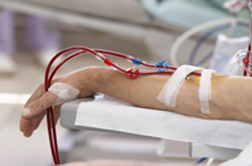 While there are various concerns with Invokana and other diabetes drugs in the class - such as the little-discussed possibility of urinary tract infections and the rare potential for issues involving the lower extremities that could lead to amputation - the primary invokana side effects are summed up in headlines screaming ‘Invokana Linked with Cardiovascular Injuries and Kidney Failure.’
While there are various concerns with Invokana and other diabetes drugs in the class - such as the little-discussed possibility of urinary tract infections and the rare potential for issues involving the lower extremities that could lead to amputation - the primary invokana side effects are summed up in headlines screaming ‘Invokana Linked with Cardiovascular Injuries and Kidney Failure.’It’s the potential for kidney failure that appears to be the focus for the most recent warnings in both the US and Canada. However, it appears that the FDA is more focused on renal failure (injury to the kidney) while Canada puts the focus on diabetic ketoacidosis (DKA), that could lead to renal failure.
The FDA, on June 14, strengthened warnings for Invokana (canagliflozin), Invokamet (canagliflozin/metformin), Jardiance (empagliflozin), Xigduo XR (dapagliflozin/metformin), Farxiga (dapagliflozin), and Glyxambi (empagliflozin/linagliptin) - all drugs in the SGLT2 class. The focus by the FDA appears to be general in nature, pointing to kidney injury that could foster Invokana side effects such as decreased urine and swelling of the lower legs and feet.
Health Canada, however, issued its own safety update on May 16. The notice followed a review of SGLT2 drugs that was launched in June of last year.
Its May 16, 2016 communique to doctors and health care professionals, Health Canada said: “Serious, sometimes life-threatening and fatal cases of diabetic ketoacidosis (DKA) have been reported in patients on sodium glucose co-transporter 2 (SGLT2) inhibitors for type 1 and type 2 diabetes.
“In a number of these cases, the presentation of the condition was atypical with only moderately increased blood glucose levels observed. SGLT2 inhibitors are NOT (source emphasis) indicated for treatment of type 1 diabetes mellitus and should not be used in type 1 diabetes.
READ MORE INVOKANA LEGAL NEWS
“Patients [should] be informed of the signs and symptoms of DKA, and be advised to immediately seek medical attention if they develop them. Caution [should] be used before initiating SGLT2 inhibitor treatment in patients with risk factors for DKA.
“The Canadian Product Monographs of these products will be updated to reflect this safety information.”
